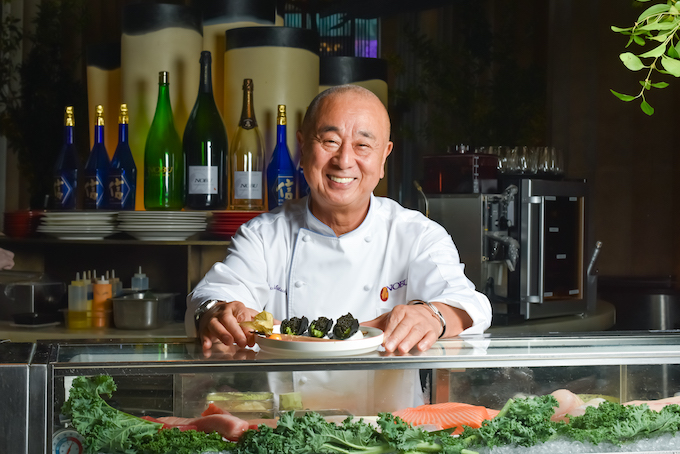“People no longer go to restaurants just for the food,” notes chef Nobu Matsuhisa. Seated in one of the elegantly-appointed private enclaves in Nobu Singapore, the celebrated chef is ruminating on what he thinks discerning diners are looking for today. At the head of an ever-growing culinary empire with over 60 restaurants under his belt, Matsuhisa certainly knows a thing or two about putting up a good dining experience.
For the jovial Matsuhisa, the true mark of a successful restaurant is the sound of laughter permeating its ambience. “Japanese fine dining restaurants tend to be very serious, where everyone is quiet all the time. Nobu is all about freedom and variety. It’s meant to be fun.”
Nobu Singapore, which is seated in a tranquil Japanese garden in the Four Seasons Hotel Singapore, opened its doors in June this year. True to Matsuhisa’s word, the space is vibrant and energetic. On any given night, the restaurant floor bustles with lively conversation as the congenial service staff bring out plate after plate of delicious Black Cod Miso.
The secret behind the iconic dish, according to Matsuhisa, is partly the level of precision written into the recipe. Every detail, from the exact weight of the fish to the 72-hour duration that each piece is marinated for, is maintained exactly. Still, there remains a magic to Black Cod Miso—and several other signature dishes from the classically-trained sushi chef—that expert cooking alone can’t explain.
“You can learn techniques, you can memorise recipes. But to me, the one thing that makes food memorable is when you cook with heart. When a dish comes from a place of passion, technicalities don’t matter as much,” Matsuhisa shares. “Before my wife and I got married, she made me a steak dish where she got mixed up between salt and sugar. You can imagine, it didn’t turn out how she thought it would. But I felt her heart through that dish, and the food truly tasted good to me.”
Here, the candid chef shares other culinary memories, what he eats on his days off and his advice for younger chefs.
Have you been enjoying your time in Singapore?
Yes, very much so. I like being here and spending time with Singaporeans as it helps me understand the culture better. I come every year for F1. I usually stay only three or four days, but I love eating crab here.

What do you think makes Nobu Singapore special?
My favourite thing is the produce here—it is very fresh, exactly like Japan. We can bring fish into Singapore from Japan four or five times a week. Restaurants in the United States or Europe can’t do that. I’ve sent my best chefs here because I know there’s a great appreciation for fine food in Singapore. My own students are cooking in this kitchen, and their technique is perfect.
What does good service in a restaurant mean to you?
Taking care of your customers is very important. But balance is key. You know how sometimes you’re in a restaurant and the moment you drink a sip of water, they’re refilling your cup? That’s service, but it may be too much. (laughs) Build relationships with your customers and get to know them. Nobu Singapore hasn’t been open for long, but we already have regulars that the team know by name.
What is your advice for young chefs who want to make cooking their career?
Younger people need experience. My advice is always to explore. Exploring means trying different things without worrying about mistakes. In fact, a mistake is sometimes a very good sign. If you’re not messing up, you’re probably not trying anything interesting.
“If you’re not messing up, you’re probably not trying anything interesting”
Are there any memorable mistakes you look back on?
A few years ago, I was filming something with a TV crew in a fish market in Hong Kong. I saw a big conch and I was pretty excited, because in Japan I love cooking with conch, it tastes great. We went back to the kitchen and I made a dish with it. When I tried it on camera, it tasted so bad. (laughs) It’s not that the conch itself was terrible—it was just a local variety that I didn’t know how to cook with. So I learnt something new that day.
What do you eat at home?
I’m always working, so I don’t often have meals at home. When I do, my wife usually cooks and we eat very simply. She’ll make miso soup, grilled fish, vegetables and steamed rice. But during the pandemic, I’ve been cooking for her more—and even making sushi sometimes!





